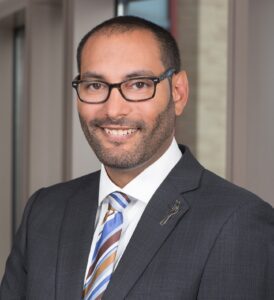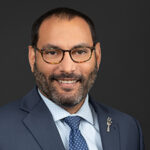For the past 15 years, William F. Harvey, MD, MSc, has been volunteering with the ACR because he sees it as a way to make a difference beyond his individual patients. He is a past chair of the Government Affairs Committee and served two terms on the ACR board of directors. As the new chair of the ACR Registries & Health Information Technology Committee (RHIT), he intends to help practitioners use the health data they painstakingly collect to improve their practices and patient care.

Dr. William Harvey
Dr. Harvey spoke to The Rheumatologist about the RHIT, his motivations for stepping up as chair and the things that keep him busy outside of work.
The Rheumatologist (TR): Why were you interested in becoming chair of the RHIT?
Dr. Harvey: I had a long-standing interest in health information technology and a deep interest in helping rheumatologists of all sorts—whether they’re clinicians or researchers—make best use of this treasure trove of data that we collect on a daily basis. I’m motivated to help improve the care of rheumatology patients and, perhaps more importantly, the lives of rheumatologists by helping them use that data in their practice.
TR: What is the purpose of the RHIT?
Dr. Harvey: The committee itself is really charged with health information and communication technology issues that affect rheumatologists and our patients. We try to help practitioners by leveraging health information to ensure safe, highly efficient, effective and equitable care.
TR: What are your plans and priorities for the RHIT in the coming year or two?
Dr. Harvey: Our primary project is the Rheumatology Informatics System for Effectiveness (RISE) registry. Most of our RISE members are private practice rheumatologists, and we have an interest in more aggressively enrolling academic sites. That interest is twofold. First, we want to provide a benefit to all rheumatologists regardless of their practice setting. And second, those academic sites more often see members of under-represented groups: racial and ethnic diversity, as well as socioeconomic diversity. To make best use of the RISE data to understand the care of rheumatology patients across the country, it’s important to include sites that have varied demographics.
The second big push is to make sure that the practices enrolled in RISE continue to have success in reporting under Medicare’s Quality Payment Program.
And third, we want to continue our work in making RISE data available to researchers to answer important questions. For example, we have large volumes of records for some rarer rheumatic diseases that are very difficult to collect otherwise.
TR: How can practices enrolled in RISE participate in planning?
Dr. Harvey: Every year we have a RISE strategic summit where we invite registered stakeholders to come and help us think about what the registry and the committee should focus on for the next year. We were unable to hold that meeting in 2020 because of the pandemic, but we will be planning a virtual summit in late spring or early summer 2021.
TR: What do you do for fun outside of ACR and rheumatology?
Dr. Harvey: I love cooking, so that’s probably the thing I do most. I also have two young kids and taking care of them takes a lot of time and is very fun. The other thing I really like doing is home projects. I’m definitely a DIYer and renovated the basement and rebuilt our deck.
TR: How did you get into medicine?
Dr. Harvey: My father is an oncologist and certainly encouraged me to get into medicine. I actually took a detour for a while in college and became very interested in politics and health policy. Eventually I decided that I could have the best of both worlds. I’m one of those lucky people who’ve been able to combine my personal hobbies and interests into a whole career that has kept me very busy, but very happy.
Kimberly Retzlaff is a freelance medical journalist based in Denver.


